Lifestyle
The truth about protein: how much you really need for healthy ageing
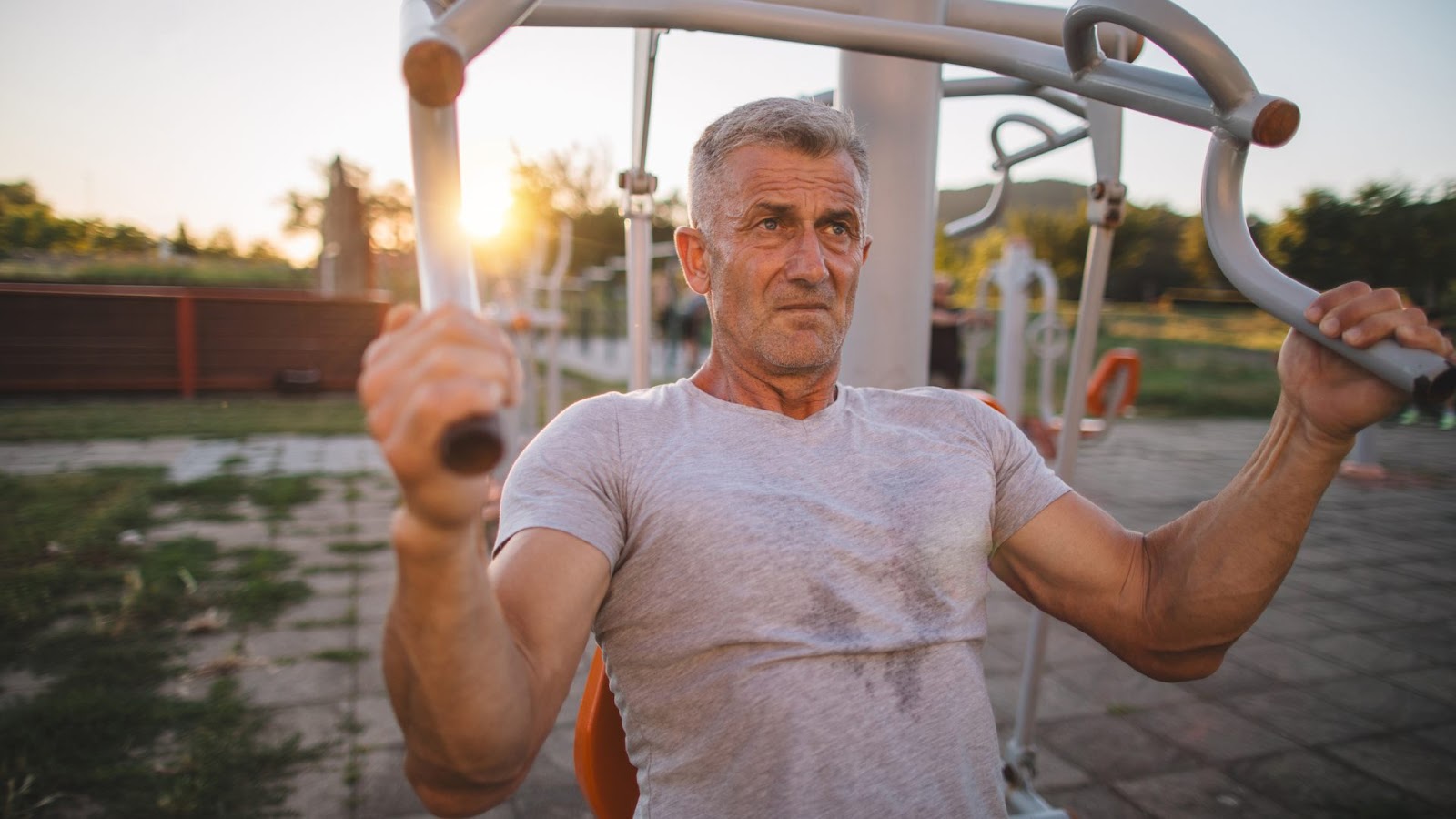
Protein is the latest nutrition buzzword, but do you really need to worry about how much you’re eating? Here’s how this essential macronutrient plays a vital role in healthy ageing.
By Sabrina Rogers-Anderson
From the low-fat diet of the ‘80s to the anti-carb craze of the ‘90s, a new nutritional enemy – or hero – captures our attention for a while before fading to obscurity amidst whispers that we had it wrong all along.
Eating enough protein is a very hot topic at the moment, but is it just another fad or should we take heed?
“Recent research has shown an evolution in recommendations for protein needs,” says food and nutrition scientist Dr Emma Beckett. “When we get our next revision of the Australian Dietary Guidelines [in 2026], we'll probably see a shift in protein recommendations, particularly in the elderly.
“So, I don't think the current focus on protein is completely without merit. But I do hope we see the concept of prioritising protein over other nutrients go away because that risks an imbalance in nutrition and consuming too many processed foods to meet protein needs.”
Why is getting enough protein important as we age?
Protein is made up of building blocks known as amino acids. There are about 20 amino acids in total, but your body can only make 11 of them and you need to get the remaining nine from food.
The vital macronutrient is involved in a wide range of functions in the body, including building and repairing muscles, bones, cartilage and skin. It also helps produce hormones, maintain healthy DNA and support the immune system.
“Eating enough protein helps us maintain muscle mass as we age, which is important for overall health and longevity,” explains Dr Beckett.
“If you can maintain your muscle mass, you’re less likely to have falls and fractures because your muscles help keep you balanced and stable. Muscle also protects bones by exerting force on them that helps them stay stronger for longer and it creates cushioning that can help protect bones in the event of a fall or injury.”
Adequate protein intake is particularly important for women after menopause.
“Hormones are involved in the creation of new bone tissue and muscle mass, so women lose more bone and muscle after menopause," says Dr Beckett. “And if they don’t eat enough protein, their bodies will need to take protein from their muscles to perform other essential bodily functions, which will make them lose even more muscle.”
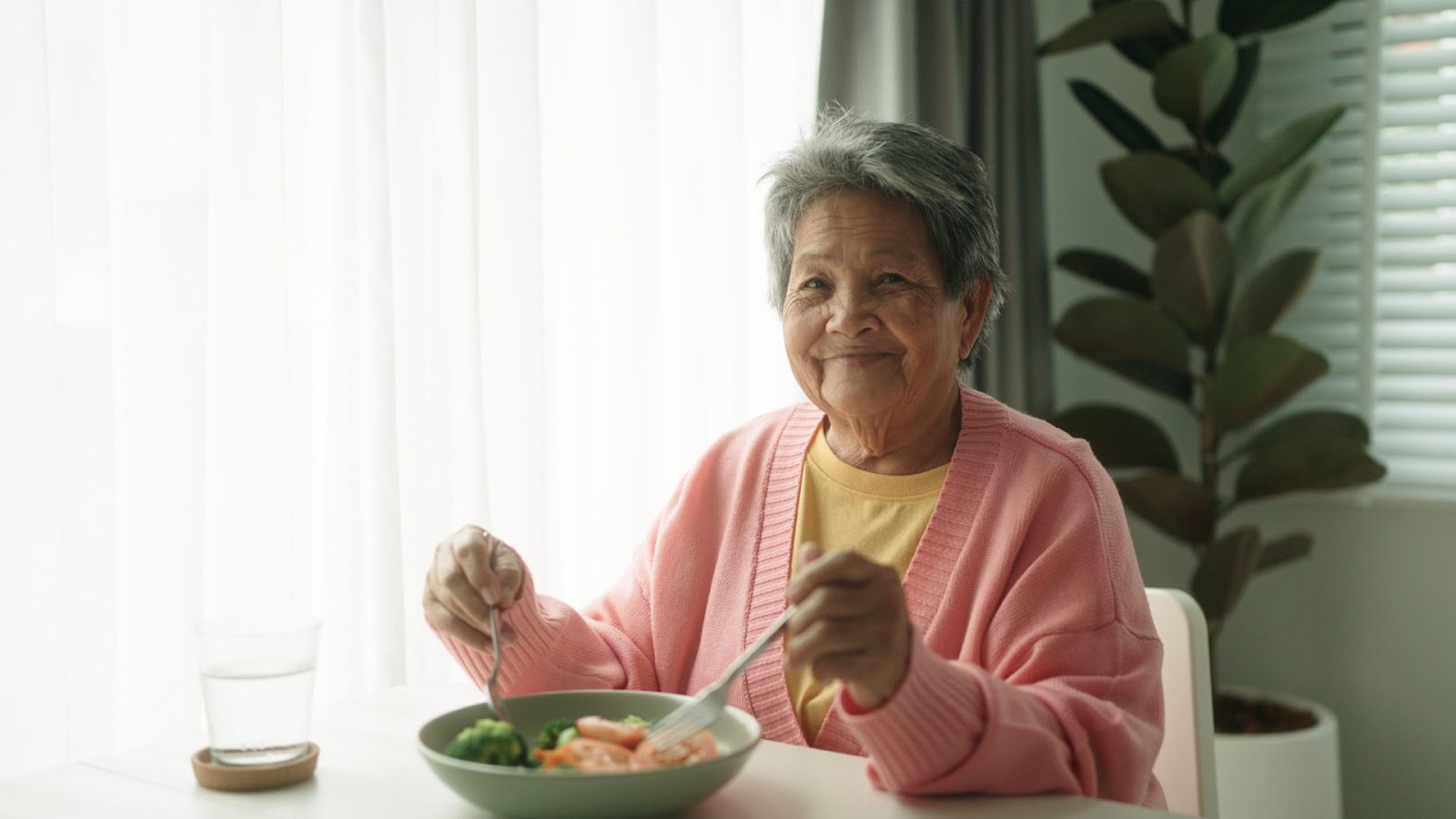
But before you stock up on steaks and protein shakes, take note: eating protein alone doesn’t create muscle.
“Your body isn't going to direct protein to the muscles unless there’s work done on those muscles, so exercise – particularly strength training – is essential,” says Dr Beckett.
More on this here: Hello muscles: 10 benefits of strength training
How much protein do you really need?
According to the Australian Government’s Nutrient Reference Values, this is is the recommended daily intake (RDI) of protein per day:
Men
- 19-70 years: 64 g/day (0.84 g/kg)
- >70 years: 81g/day (1.07 g/kg)
Women
- 19-70 years: 46 g/day (0.75 g/kg)
- >70 years: 57g/day (1.07 g/kg)
The first number indicates an average for that age group, but if you want to calculate exactly how much protein you need each day, you can use the formula in brackets:
- A 60-year-old woman who weighs 70kg should eat 0.75 grams of protein per kilogram of body weight each day, or 52.5g
- A 60-year-old man weighing 85kg should eat 71.4g of protein a day
Do you need to go higher?
But many nutritionists and dietitians are now recommending much higher levels of protein – up to 2g/kg a day – so what’s the go?
“The RDI [outlined above] is about preventing deficiency,” explains Dr Beckett. “Some nutrients also have suggested dietary targets – or SDTs – but there has to be evidence that eating more of that nutrient may optimise long-term health outcomes for it to get a SDT.
She also points out that while some people are in a position to be able to eat for wellbeing and longevity, others are “literally just trying to survive.
We need to respect both those needs and that’s the difference between those two numbers,” she says. “Protein doesn’t have a SDT yet, but I think it will probably get one in the next revision of the dietary guidelines, which will be a positive change.”
So, if you’re a taller or more active person or you’re trying to put on lean muscle mass, you can certainly eat above and beyond the protein recommendations in the Dietary Guidelines.
The International Society of Sports Nutrition says it’s not only safe for active people to eat up to 2 grams of protein per kilogram of body weight each day, it can also help them adapt to their training and achieve their fitness goals.
Here’s a simpler way to eat enough protein
Does the idea of busting out your calculator at every meal make you want to give up before you’ve even started? Dr Beckett has a much simpler approach to help you get the protein you need if you’re just an everyday person trying to stay healthy.
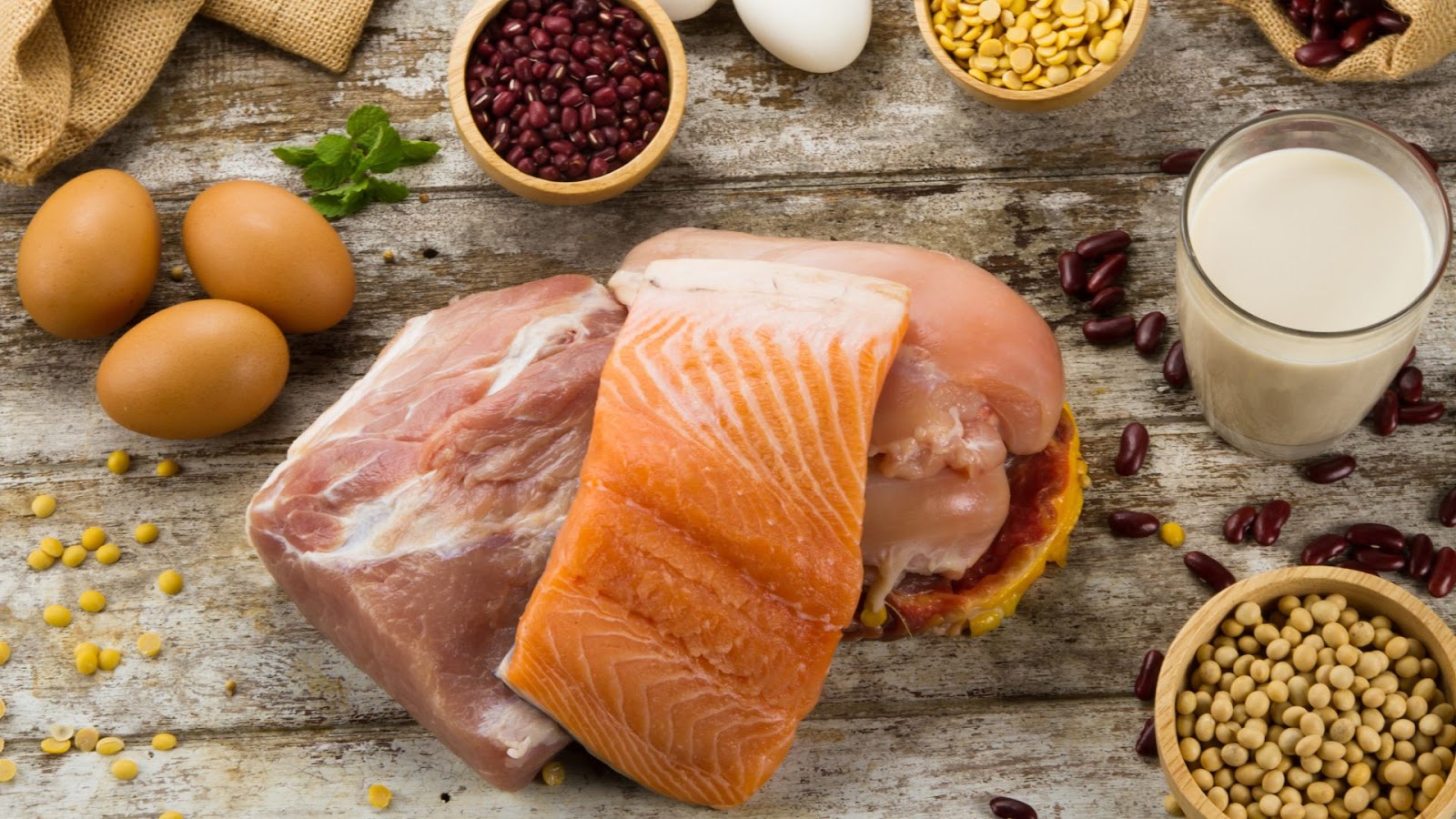
“Some people talk about getting 30 grams of protein in your breakfast and splitting your protein evenly across your main meals, but for many people that’s not practical or appetising and it may put them off breakfast or protein altogether,” says Dr Beckett.
“I actually don't recommend that people think about grams of protein or fat. The point of the Australian Dietary Guidelines is to get you to eat within the guidelines without needing to think about them. If you eat the recommended number of serves of each food group every day for your age group, all your nutritional needs will be covered.”
The two main food groups that provide protein are:
- Lean meats and poultry, fish, eggs, tofu, nuts and seeds, and legumes/beans
- Milk, yoghurt, cheese and/or alternatives, mostly reduced fat
Here are the recommendations to help you meet your protein needs:
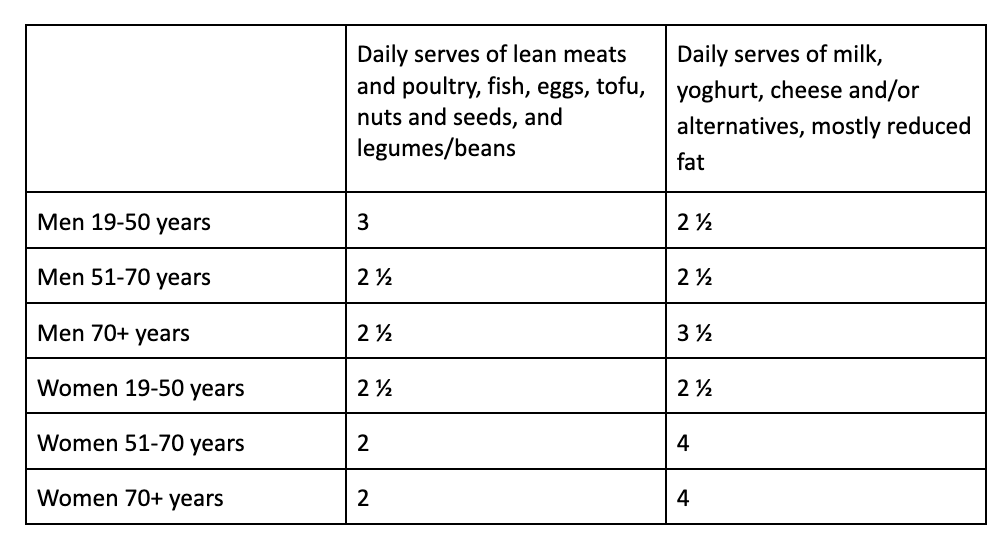
What are the best sources of protein?
From powders to bars and even water, there seems to be an endless selection of processed high-protein products on supermarket shelves. But are they healthy choices?
“I'm not anti-protein powders or anti-processed food, but I'm pro food first,” says Dr Beckett. “If you focus on processed products, you don't get enough bioactives, which are compounds that aren’t essential for survival but can reduce our risk of cancer, diabetes, cardiovascular disease and other chronic illnesses.
That said, Dr Beckett does think processed products have their place. “Sometimes people get a bit evangelical about it and say you should only be eating real food, but there are contexts where supplements and packaged products are useful. It's like breastfeeding where we say breast is best, but we don't say formula is the devil.”
When it comes to choosing meat versus plant-based sources of protein, Dr Beckett recommends the same balanced approach.
“There's a lot of masculinity heroing around high-meat diets like the carnivore diet, but foods like nuts, seeds and legumes are high in both protein and fibre and have a range of health benefits that meat doesn't have. Once again, I’m not against animal sources of protein, but it's much easier to have too much red or processed meat, which increases your risk of disease.”
Dairy products are another great source of protein that’s unfairly shunned due to misinformation.
“People have been told dairy is bad for them or they think it will make them gain weight, but it’s a great whole food source of protein that doesn't come with the health risks of eating too much meat,” says Dr Beckett.
“The dairy recommendations are higher in older age groups, which covers the need both for more calcium and more protein as we age.”
More on this: Full-fat dairy products may be healthier than we thought
Here’s a quick guide to the average amount of protein in a range of foods:
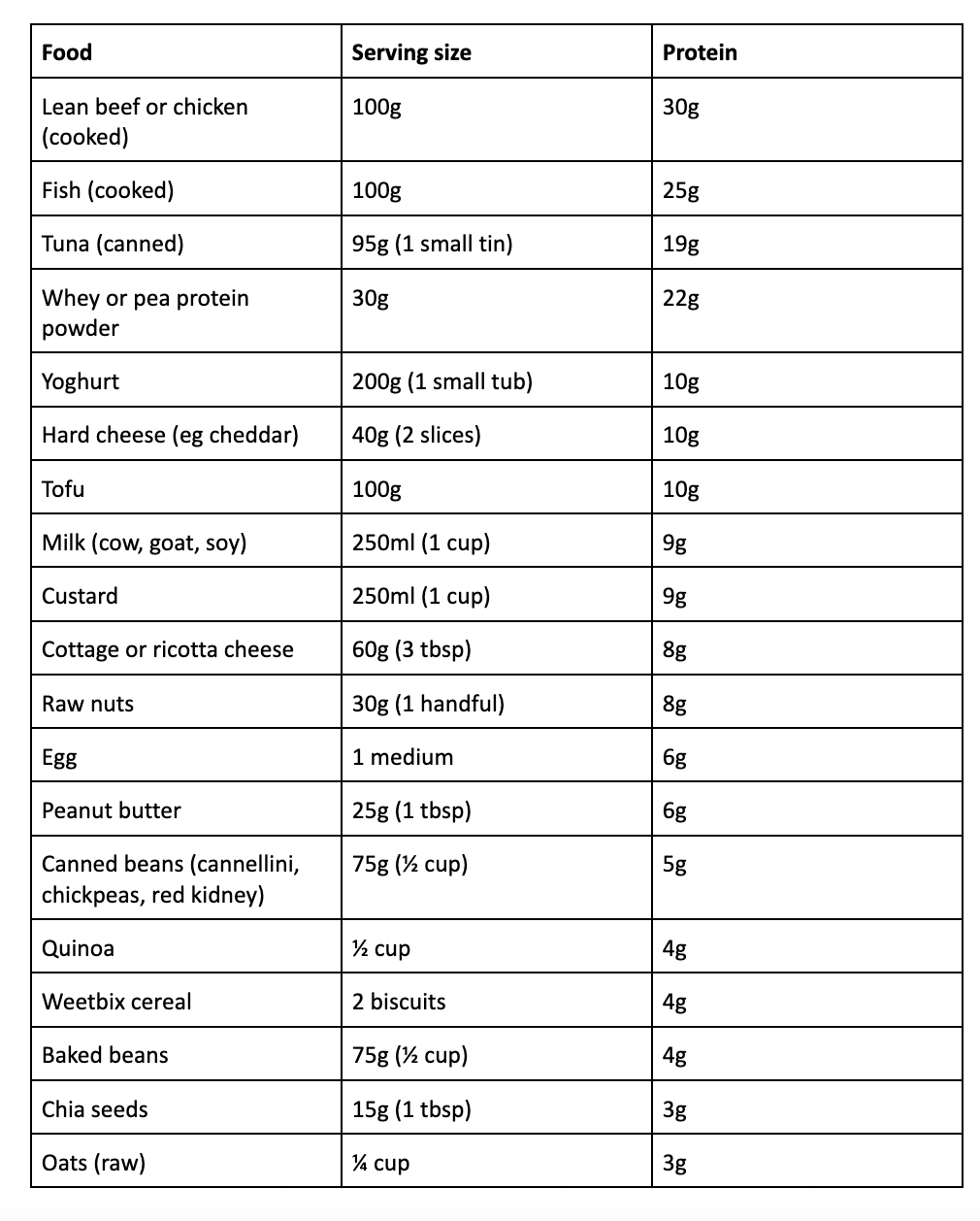
Can you eat too much protein?
Eating too much protein can lead to everything from weight gain to serious health consequences.
“There's a myth that carbs and fat will make you gain weight, but protein won't,” says Dr Beckett. "The truth is that protein has the exact same number of calories per gram as carbohydrates, and excess energy from any source will be converted into and stored as fat. So, while it's probably harder to overdo protein because it’s very filling, you can gain weight on a high-protein diet.”
As for the health risks of too much protein, it depends on the source. “Eating too much protein from food sources like meat could mean that you don't eat enough of something else, such as fibre or calcium,” says Dr Beckett.
“And if you focus on processed products and supplements, not only do you not get enough of those bioactives that reduce your risk of disease, but you could potentially see an actual harm from the protein if you overdo it. Protein needs to be broken down and converted for storage, and that can have consequences for the kidneys and the liver.
“If you have kidney disease, you definitely should talk to your dietician or doctor about what your protein needs are because too much protein can be very harmful.”
The power of protein
How much protein you should eat depends on your age, general health and fitness goals.
Want to avoid losing too much muscle mass and protect yourself from falls as you age? Follow the Australian Dietary Guidelines.
Trying to pack on lean muscle to run after your grandkids or audition for the next Ninja Warrior? Count those protein grams like a pro.
But like with any other good thing, don’t overdo it or you could end up with other nutritional deficiencies.
The information on this page is general information and should not be used to diagnose or treat a health problem or disease. Do not use the information found on this page as a substitute for professional health care advice. Any information you find on this page or on external sites which are linked to on this page should be verified with your professional health care provider.
Feature image: iStock/Popartic
More on food and drink choices here:
